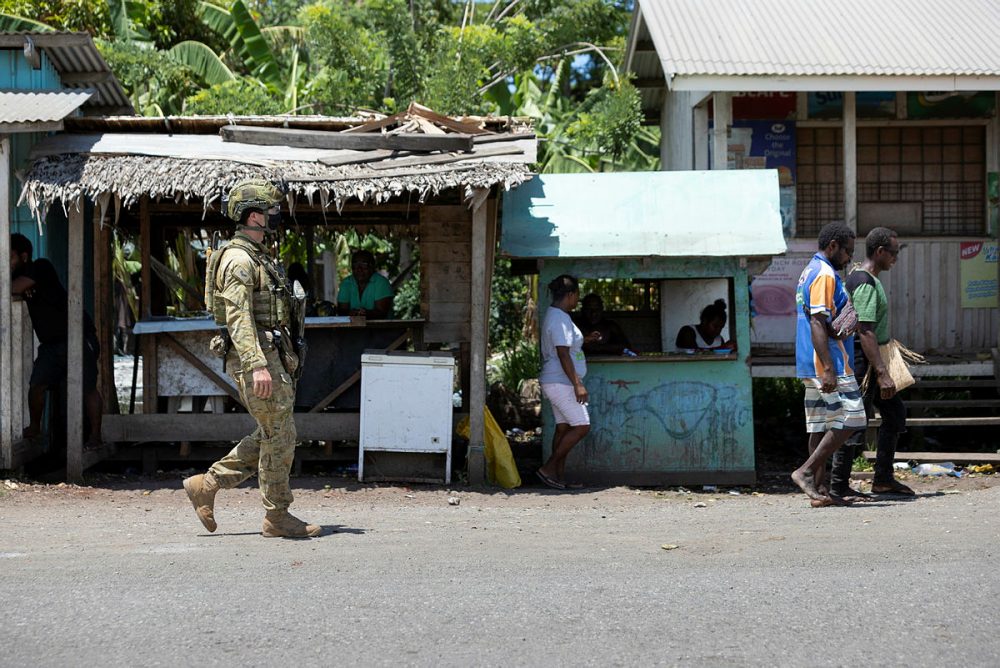
In January, the US Indo-Pacific coordinator, Kurt Campbell,
told the Center for Strategic and International Studies in Washington that the Pacific was the place most likely to see ‘strategic surprise’. He said the US needed to do more in the region quickly and work with partners like Australia, Japan, France and New Zealand.
Last week we saw an example of this surprise with a leaked draft agreement between China and Solomon Islands that lays down a framework that could, among other things, permit Beijing to deploy forces to ‘protect the safety of Chinese personnel and major projects in Solomon Islands’. There’s debate around how mature the agreement is, but the fact that is exists should be a wake-up call for Australia strategic planners.
The draft document states that the Solomon Islands may ‘request China to send police, armed police, military personnel and other law enforcement and armed forces’ to the country. It also states that China may ‘make ship visits, to carry out logistical replenishment in, and have stopover and transition in Solomon Islands’.
According to
media reports, ‘Australian officials are already uneasy about growing security cooperation between China and Solomon Islands.’
However, if we had been paying more attention to what was going on in our backyard rather than seeking to find savings by cutting aid and human presence on the ground over the past decade or two, this might never have happened—or at least it wouldn’t have come as a shock.
For several years, regional observers have been raising concerns about China’s increasing encroachment and infrastructure development in Solomon Islands. Reports on the ground suggest that Australia is being played by Solomon Islands Prime Minister Manasseh Sogavare and there’s a view that any discussion on this isn’t welcomed by Australian officials because it’s seen as upsetting the status quo.
According to a senior Solomon Islands politician, ‘This is a time when the Australian government needs to support our democracy.’ Celsus Talifilu, a local political adviser to Malaita Province Premier Daniel Suidani, expressed concern about the draft security agreement and reports that fake Chinese weapons are being used to train local police. He said that it presents a ‘genuine threat’ to his province and its people.
It’s not Australia’s place to get involved in the internal politics of another nation, but in the rapidly changing and highly contested environment of the Indo-Pacific, the last thing Australia and its allies need is a fractured state or unwanted military base on their doorstep.
One could argue, as Prime Minister Scott Morrison has, that this is exactly what the government’s Pacific step-up program has been doing. But while there have been some excellent initiatives, sometimes the local reality doesn’t match the Canberra rhetoric. We can’t ignore or dismiss this and perhaps it is time to rethink how we get this right.
The immediate issue of unwanted military posturing on Australia’s doorstep needs to be addressed; however, there’s a broader issue here about how we build genuine partnerships in our neighbourhood.
It’s not a matter of just acting reflexively to increase Australian aid. We need to rethink our security and defence cooperation programs. We should be placing much more focus on professional development, training and capacity-building for security forces. This would include enhanced personnel exchanges and programs that are tailored to meet genuine needs and infrastructure investment that fosters local skills and partnerships (rather than debt diplomacy).
Getting this right requires building long-term trust through people-to-people linkages that enable better management of future shocks, and therefore add resilience to Australia and our neighbours.
Practical first steps that we can take to help build this ballast in our regional relationships include increasing the capacity and depth of Pacific and Asian studies programs in our schools and universities; building Asia-capable business leaders who better understand our northern neighbourhood—which equates to almost 60% of the global population; and designing truly collaborative government programs and projects. This may require doing things differently.
Australia has an opportunity to match our rhetoric with practical action and to become a better neighbour. We must not let it pass us by.
 Print This Post
Print This Post